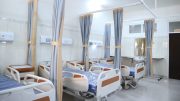International medical imaging IT and cybersecurity company Sectra has signed a five-year contract with North Tees and Hartlepool NHS Foundation Trust for the delivery of a regional digital pathology solution to the Northern Cancer Alliance. The solution will span the ten separate trusts of the consortium and aims to improve cancer care workflows through enabling pathologists to instantly access and share images and information between departments and locations.
The Northern Cancer Alliance is a multi-agency collaborative that was set up to improve cancer survival rates across the North East of England and North Cumbria.
As a result of the deal with Sectra, they will scan pathology slides and send the images to a single data repository. This will mean that clinicians working anywhere in the region will have access to the information, making it easier for them access patient information, ask for second opinions, and hold multi-disciplinary team meetings.
Maria Francisca Freitas da Silva, Sectra business development manager for digital pathology, explained that it has developed widely over the past ten-years and is widely used in research. However, the Northern Cancer Alliance deal is unprecedented because of the size of the region, the number of hospitals involved, and a commitment to 100% digital working.
“This is very ambitious,” she said. “Nobody has done this before on this scale.”
“Digital pathology will be an enabler for collaborative working across large geographic areas, streamlining pathology diagnostic decision making, particularly for cancer diagnosis and multidisciplinary team meeting discussions. This represents the biggest and most exciting change to the way Cellular Pathologist work in a generation.” says Dr Paul Barrett, histopathologist at County Durham and Darlington NHS Foundation Trust and co-clinical lead of the project.
The solution will support 115 pathologists across the trusts, conducting an average of 300,000 examinations a year. Through Sectra’s central solution, they will be able to access all pathology images produced by the consortium and get one consolidated view of a patient record from a single interface.
Dr Sonali Natu, histopathologist at North Tees and Hartlepool NHS Foundation Trust and the other co-clinical lead of the project, adds “As an integrated health and care system, we need to move away from isolation and head towards integration. This platform will deliver a large part of that ambition for the patients we serve. The digital access to pathology images and digital tools for reviewing them will in the end translate into easier collaboration, more resilient services and improved patient care.”
Digital pathology will give the pathologists functions beyond the microscope. Without the need for physical glass slides, digital access to current and historical images is enabled from anywhere and at any time. The digital solution provides pathologists with assistance at critical decision points, such as grading or doing more precise measurements. It also enables image analysis, which in turn reduces variation and improves the precision of tasks such as cell counting. The digital access further facilitates second opinions, external reading resources, specialist consultations and regional MDT case review meetings.
Alison Featherstone, Northern Cancer Alliance manager, said: “With our aim of getting cancers diagnosed earlier we need to ensure that we are making the best use of the highly skilled pathology staff that we have. This will help us to build capacity and resilience in this key NHS workforce.
The system will support earlier diagnosis of cancers by using computer-aided algorithms that can highlight areas of images where cells are dividing rapidly and guide the clinicians to those areas for examination. It will also enable more accurate measurement of and comparison of images using panoramic images.”
The deployment will be a significant integration challenge, since the new system will need to integrate with the patient administration and laboratory information systems in use at each trust, and work will start this spring. If the project is successful, it is likely to be seen as a model for other pathology networks to follow.





